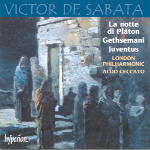Yes, famous Italian conductor Victor De Sabata was a composer too, and no, he wasn’t a good one. Despite the rather pretentious titles and the high seriousness with which he evidently approached the act of creation, De Sabata’s music practically defines the phrase “generic Late Romantic”. La notte di Plàton (Plato’s Night) purportedly describes the dialectical contrast between frenzy and contemplation. The active passages feature lots of energetic writing for brass and percussion, with a far too prominent (both in the scoring and as recorded here) bass drum, lots of tambourine tinkling, and the obligatory whack on the tam-tam at the climax. Unsurprisingly, the contemplative passages call for divided strings and thick harp arpeggios, evoking a sort of generalized, vaguely Mediterranean warmth. The thematic material itself is so forgettable as to be nonexistent, the harmony equally uninteresting. Gethsamani, ominously subtitled “Poema contemplativo”, turns out as promised to be the longest and dullest of the three works. It simply takes the “comtemplative” orchestral manner of the previous piece and stretches it out to ungodly lengths, just as Juventus does the same for the music in “active” mode. Committed performances and vivid (if bass-heavy, as noted) sonics give this curiously impersonal, characterless music what little allure it probably has. Disappointing.
































